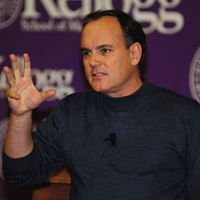| |
 |
| |
© Nathan Mandell
Philip Marineau ’70, president and CEO of Levi,
Strauss and Co. delivers a conference keynote. |
| |
|
Zell
Conference reveals next marketing wave
Marketers turn their attention
to next generation:
Zell Center conference explores strategies for communicating
with “Gen Y”
By
Kari Richardson
First came the
baby boomers. Shaped by the Vietnam War and the assassination
of President John F. Kennedy, as young adults they stretched
the boundaries of societal institutions, made their mantra
“free love” and questioned everything around them.
Next there was
Generation X, the skeptical children of a television age,
who grew even more jaded as they watched their parents divorce
and the economy sink during the 1970s.
The most recent
group to come of age in the postwar era is known as Generation
Y, those who are now 7 to 25 years old. Gen Y makes up about
21 percent of the population with some 70 million members
— a total that exceeds the number of baby boomers when
that generation hit its peak.
It’s no surprise
that marketers are eager to figure out what makes this latest
generation tick.
To learn
more about the strategies firms are using to court Gen Y,
about 200 people gathered at the Kellogg School on Nov. 1-2
for a conference titled, “The Risk of Misreading Generation
Y: The Need for New Marketing Strategies.” The
Zell Center for Risk Research, its mission to promote
the study and understanding of the way people perceive risk,
co-sponsored the event with the Kellogg
Marketing Department.
Marketing
experts from both the business and academic communities participated
in panels focused on ways to understand, communicate with,
and develop product offerings for “Y.” The keynote
speakers for the event featured Philip A. Marineau ’70,
president and CEO of Levi, Strauss and Co., and Christopher
B. Galvin ’77, chairman and CEO of Motorola Inc.
To anyone
trying to market a product, “Y” is more than another
letter in an alphabet soup of generations. As a group, teen-agers
spend more than $175 billion annually, according to figures
from the conference.
Marineau, CEO
of Levi, Strauss and Co. for the past three years, was hired
to combat declining sales at his firm and reposition the brand
with a new generation of denim wearers. To that end, the turnaround
expert has helped the company introduce fresh styles and identify
new places to sell its product.
Marineau realizes
recapturing the attention of youth will be crucial if Levi
is to increase its sales.
“Today we
are definitely the jeans of the baby boomer generation,”
he said. “I’m wearing a pair of classic 501s,
the original jeans. … If you talk to Generation Y, these
tight-fitting, antifit jeans are not necessarily the kind
of jeans that they want to wear.
“One of
the keys to (our) success is to win over Generation Y.”
Charles D. Schewe
’72, a professor of marketing at the University of Massachusetts,
said it is not merely age, but shared cultural experiences
that give each generation its collective values and traits.
Members of Gen Y, for example, grew up during a time of economic
prosperity, but also experienced the terror of the Columbine
High shootings and the Sept. 11 attacks.
As a consequence,
Schewe says, Y’s are team players who crave “real
experiences” instead of hype, and remain hopeful about
the future, despite increasing threats to their security.
“It’s
mostly the stock market that has given them this sense of
optimism,” he said.
Said Marineau:
“This is the most ethnically diverse generation we’ve
ever known. They are better educated and there’s more
gender equity among them.”
But savvy marketing
professionals realize some things never change. Youth of all
generations are fun loving, like to experiment and crave independence.
Robert Bailey
’68, executive vice president for research and planning
at BBDO Chicago, says his advertising firm had success marketing
Wrigley’s chewing gum to Generation Y using classic
themes such as fun, friendship and desire for the opposite
sex.
“We find
the insights that motivate Generation Y are often timeless,”
Bailey said.
|



